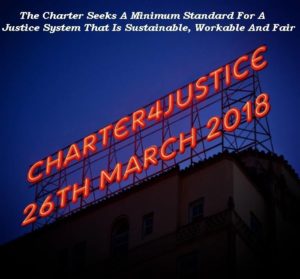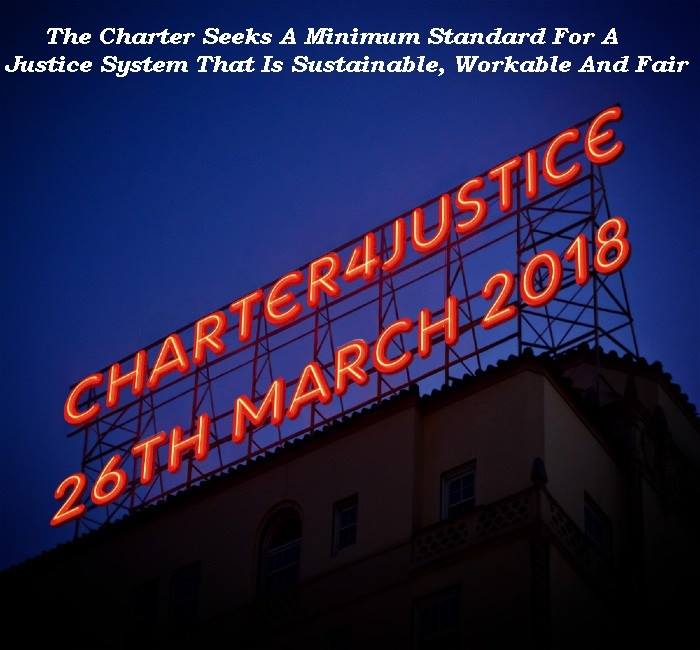Monthly Archives: March 2018
On 26 March 2018 the Charter for Justice was launched by the London Criminal Courts Solicitors’ Association (LCCSA) together with the Criminal Bar Association (CBA) and Criminal Law Solicitors Association (CLSA).
In combination with other initiatives such as the one that can be read about here, the aim is to set out clearly the key principles needed to ensure a fair and properly functioning Justice system.
 The Charter was produced following engagement with the CBA, CLSA and the Howard League for Penal Reform. It is hoped that the Charter become a living, changing entity like the law itself, and is influenced by those who care about justice.
The Charter was produced following engagement with the CBA, CLSA and the Howard League for Penal Reform. It is hoped that the Charter become a living, changing entity like the law itself, and is influenced by those who care about justice.
The launch took place at the Law Society on 26th March. A panel of speakers, chaired by Greg Foxmith, addressed those attending on a number of issues.
- CBA chair Angela Rafferty QC spoke on funding issues and access to justice
- Laura Jane from the Howard League addressed the prison and probation crisis.
- Raj Chada talked tackling discrimination and prejudice at the police stations and in court.
- Jerry Hayes addressed ongoing issues with disclosure.
- Penelope Gibbs from Transform Justice discussed ideas of Open Justice.
The contents of the Charter for Justice are set out below:
Charter for Justice
Preamble
For too many years those who are close to the criminal justice system have observed the impact of funding restraints and cuts which have led to dilapidated buildings, reduced access to Justice, and a prison service on the point of collapse. The Lammy report has highlighted inequality of outcomes, and recently highlighted disclosure problems have shown systemic failures in the system.
This charter seeks to set the standards for a justice system that is sustainable, workable and fair.
1. Equal Access to Justice
Publicly funded representation is essential for defence and prosecution.
The CPS needs to be properly funded to properly present cases, and legal aid sufficiently available and remunerated to ensure equality of arms in an adversarial justice system, and to allow everyone access to legal advice and representation irrespective of mean
2. Disclosure
There should be full and fair disclosure of the Prosecution case to a suspect at the police station and defendant at court. Criminal justice is not a game, and proper disclosure needs to be made in a timely fashion so that those accused by the state can fully understand what they are accused of, and respond accordingly.
Failures in the disclosure process waste huge resources throughout the system and result in wrongful convictions, avoidable appeals and abandoned trials, damaging both the accused and victims of crime and undermining public confidence.
There is an urgent need to increase fairness, effectiveness and accountability within the disclosure process.
3. Open Justice
There should be no further court closures, and court buildings and their fabric should be maintained to an acceptable standard. The latest initiative of online pleas is a dangerous development that will remove the direct engagement that a defendant has with the court and legal representatives.
Every defendant or witness or member of the public should have a right to attend a court hearing in person.
The recent change to the Police and Criminal Evidence Act allowing the police to video-interview people wherever they choose without legal advice undermines vital protections for those suspected of crime and should be prohibited. This is especially dangerous for the young, those with mental health issues or learning disabilities, or for whom English is not a first language.
4. A humane and effective prison and probation service
Urgent action is required to upgrade and maintain the quality of prison buildings and facilities. There are too many people in prison and at risk of being sent to prison for failing to comply with conditions and urgent action is required to reduce the number of people in prison.
We must learn from other countries where prisons are more forward thinking and humane and re-offending rates are lower. There must be recruitment and retention of sufficient prison officers, and access to properly funded rehabilitation and education courses within the prison system.
The part privatisation of the probation service is a costly failure which should be reversed.
5. A Fair Justice system
Urgent action is needed to achieve equality of justice and eradicate the discrimination identified in the Lammy Report. Unless all have faith in the processes as well as the outcomes of our justice system, trust in the system will ebb away.
We need to work to eliminate unconscious bias amongst all those involved in the system through diverse recruitment, better training and rigorous monitoring.
Justice cannot be seen to be done when there are the clear differences in treatment and outcome identified in the Lammy Report, or arising through use of the legal concept of joint enterprise.
The LCCSA website can be found here so that you can follow developments of the Charter for Justice.
Monthly Archives: March 2018
Unfortunately the criminal justice system is failing suspects, defendants and victims. The public are right to be alarmed. Action for justice is required.
The criminal justice system is in crisis.
 Both organisations have joined together to shine a light on the failing in the system. The intention is to provide every sitting Member of Parliament with the book by the Secret Barrister. The volume, Stories of the Law and How it is Broken, sets out a litnay of failures present in the current system.
Both organisations have joined together to shine a light on the failing in the system. The intention is to provide every sitting Member of Parliament with the book by the Secret Barrister. The volume, Stories of the Law and How it is Broken, sets out a litnay of failures present in the current system.
Along with this book, the MPs are to be given a copy of the Young Legal Aid Lawyers Report on Social Mobility along with a list of key facts.
 Principled parliamentarians must be allies in the fight for justice. It cannot be a party political issue. The rule of law and access to justice are fundamental to a healthy and functioning democratic society.
Principled parliamentarians must be allies in the fight for justice. It cannot be a party political issue. The rule of law and access to justice are fundamental to a healthy and functioning democratic society.
Every aspect of the criminal justice system is under threat.
The progress made on diversity is in grave danger, with profound consequences for public trust as the judiciary, professions and institutions cease to reflect the communities they serve

Every week brings news of another criminal trial collapsing due to lack of adequate resources. The disclosure debacles are just one very high profile example of the damage being done to our once great system from chronic and deliberate lack of investment.
In 2016 MPs were told by the Public Accounts Committee that the Criminal Justice System was at breaking point. After 20 years of successive cuts, the system is now broken.
In planning more cuts, Ministers are making an unequivocal commitment to underfunding the legal system, and to refusing to provide a quality of justice that the public are entitled to expect.
The campaign will cost money, and the hope is that a public appeal will raise the £10 000 needed.
Follow this link to read more and pledge a donation to support the cause of justice.
Monthly Archives: March 2018
Chesterfield Motoring Solicitor David Gittins was recently instructed in a case where his client was at real risk of a driving ban. This would have meant the loss of his job as a taxi driver and a substantial impact on his 4 children.
David’s client had been caught driving at 76 mph in an 30 mph speed limit close to Chesterfield Town Centre. David’s strong advocacy and diligent preparation enabled the client to keep his driving licence. Instead he left the court with a fine and penalty points.
This case, perhaps better than most, demonstrates the benefits of choosing a local Chesterfield motoring solicitor carefully. Surprisingly, David’s client had tried to instruct another local solicitor’s firm. They had declined to take the instruction as they didn’t believe he could save the Defendant’s driving license.
Benefits of a local Chesterfield motoring solicitor
David’s client told him that he had been caught speeding whilst driving out of Chesterfield town centre along Derby Road at excessive speeds. With local knowledge, David was immediately able to recognise the seriousness of the situation.
David’s client had been running late and had made a terrible error in trying to make up time by grossly exceeding the speed limit. His client did not dispute the speed. He indicated to David his desire to plead guilty at the very first opportunity in order to gain maximum credit and demonstrate his remorse. In retrospect he appreciated the potential danger he created with this piece of driving.
Our client required his driving licence to be able to work. David had to make his client aware that due to the level of speed the Court would consider imposing an immediate driving disqualification of up to 56 days.
As a Chesterfield motoring solicitor, David knew that the local Magistrates would also know the road in question. Because of this he knew that the only way in which he could keep his client’s license was to prepare detailed mitigation to present to the Court.
David had two lengthy conferences with his client in advance of the Court hearing. This was to take details of how a disqualification would impact upon him, his wife and their four children. For example, he provided transport to a separate school for each child, as well as to a variety of after school activities. Bluntly put, if the client lost his license it was almost impossible for the children to attend school on time due to their age and the travel involved.
David preparing a map to show the court the acute difficulties that his client’s children would face. He also secured references on behalf of his client. For example, his client was involved in the local community tackling drug addiction.
Penalty Points rather than a driving ban
As a result of this detailed preparation and strong advocacy, David was able to present his client’s mitigation in an extremely effective way. Because of this, the Magistrates’ were persuaded to take a lenient approach. David’s client received a fine and penalty points but no driving ban. This meant that he was able to keep his employment and was understandably delighted with the outcome.
Contact a Chesterfield Motoring Solicitor

If you require the advice and representation of an expert motoring solicitor then please contact David at our Chesterfield office on 01246 283000 or use the contact form below. Details of our Chesterfield office can be found here.
David can provide you with detailed and affordable advice as to whether you are able to challenge the prosecution evidence relating to your road traffic offence, or how you are likely to be sentenced following a guilty plea.
Contact
Monthly Archives: March 2018
Chesterfield Crown Court litigator Ruth Campbell and Nottingham Solicitor Advocate Andrew Wesley were recently instructed in another case involving a prosecution dependent on evidence provided by paedophile hunters. An outline of a previous case that failed due to problems with such evidence can be found here.
There client had an unusual defence to put forward. He had logged into an adult chatroom. He believed that any conversations he had online, and later on other social media threads, was with a person pretending to be a child for the purposes of a sexual fantasy.
His instructions were that a full record of each conversation would support his account. As a result, immediately following his not guilty plea, specific enquiries were made of the prosecution.
Evidence required from paedophile hunters’ phones
In order to establish the evidence that could lead to our client’s acquittal the following information was requested:
- full threads of the messaging from the adult site taken from the paedophile hunters’ phones
- similar threads from other messaging apps used to communicate, again from their phones
- the profiles that the hunters were using on the adult site
- our client’s profile
It appears often the case that the police are content to rely upon screenshots given to them by the paedophile hunters. As a result, the prosecution is dependent upon evidence that may be incomplete. It a client intends to advance a defence it is vital that these enquiries are made immediately.
The witnesses also maintained that our client had made a confession that had been filmed and streamed. The footage located online was only partial and did not contain a confession. That material was also sought.
The prosecution asked for the case to be brought into the list several months before the trial date. This was because, as a result of our enquiries, they had look at the case and intended to offer no evidence. This was because the prosecution had been unable to secure the evidence that we had requested and as a result could not check its veracity or accuracy.
The evidence had not been preserved by the witnesses themselves, and was no longer available. A software corruption had also occurred which mean that the phones could not be properly interrogated now. Finally, there was no footage said to contain a confession to the offence.
Paedophile hunters ‘need to be aware of the rules’
The Judge hearing the case observed that in terms of case numbers, prosecutions dependent upon evidence from paedophile hunters was a ‘growth area’. Although a large proportion of these cases result in a guilty plea, particularly where charges are backed up with a video of a meeting.
He went on, however, to express a real concern about the nature of the ‘investigators’, accepting that this was in many cases a ‘loose’ use of the term. The Judge expressed concerns that they operated outside any statutory scheme of evidence preservation and disclosure. If they were to continue in such cases, his view was that they ought to be made aware of the rules. If they do not consider and comply with the rules, they won’t be a help and their conduct will lead to more cases with difficulties such as this one.
Contact a Crown Court litigation specialist

It may be that you face potential proceedings based on evidence provided by paedophile hunters, or another serious allegation. If so, you will wish to instruct a Crown Court litigation and advocacy team that will takes steps at an early stage of proceedings to advance your case where necessary.
Ruth is based at our new Chesterfield office. You can find the contact details here. Alternatively you can use the contact form below. If one of our other offices is closer to you then please contact the one most convenient to you for an appointment.
Contact
Monthly Archives: March 2018

Chesterfield crime solicitor Denney Lau has had another busy week,combining police station representation, Magistrates’ court cases and office appointments.
You can read more about this below.
Monday
Negotiated basis of plea
Denney’s first client of his working week was a person who had been arrested on a warrant that had been outstanding since November 2016 and was before Chesterfield Magistrates’ Court. Although he accepted being guilty of an offence of assault, he did not accept the full extent of the allegation. Denney was able to negotiate a basis of plea that was acceptable to the prosecution and the court. He pleaded guilty and received a financial penalty.
Legal aid was granted which meant that our representation was free of charge to our client.
Trial prepared but no client
Later that day, Denney was to represent another legally-aided client who faced trial for theft from a dwelling. The witness was to give evidence over a live link from Oxford. The trial was fully prepared, but in the our client didn’t attend and the trial could not go ahead.
Tuesday
Client released under investigation
On Tuesday morning a client sought our independent legal advice in police interview. The allegation was one of commercial burglary from the summer of 2017. He had been detained at chesterfield police station allegation of non dwelling burglary. Following advice, our client put forward an account denying responsibility for the offence.
Representations were made that our client should not be detained while a decision from the Crown Prosecution Service was sought. Instead, he should be released under investigation so that the final decision can be communicated at a later date.
Criminal legal aid meant that this advice and representation was free of charge.
Suspended rather than immediate custody
Again with the benefit of criminal legal aid, Chesterfield crime solicitor Denney Lau represented a client who had breached his community order on two separate occasions. To make matters worse, he had been unlawfully at large on a warrant without bail since September 2017.
The District Judge gave an immediate indication that he had no alternative but to send our client to prison immediately. Having heard mitigation from Denney, instead he felt able to impose a suspended sentence leading to our client’s immediate release.
A night on call at Chesterfield police station
Lack of evidence on theft
Denney’s first client of the evening was a person who had been arrested for an allegation of theft. A lack of evidence meant that our client chose not to answer police questions. His continued detention was authorised to permit consideration of identification procedures and to see whether any further evidence was to be provided.
Representations secure bail from police

His second client had been arrested for driving whilst disqualified but denied that allegation after receiving free and independent legal advice. He was already being investigated for an identical offence.
Denney’s client was charged with both sets of offences. The officer made representation to the custody sergeant that, bearing in mind the repeat allegations, our client should be detained for a remand application in the morning.
After hearing representations from Denney, the sergeant was persuaded to bail his client to court instead.
Wednesday
Chesterfield police station part two
Denney returned to Chesterfield police station to continue to represent the person detained for theft the night before. There was a co-accused by now, although the co-accused was represented by a different firm of solicitor.
Our client was charged with several allegations of theft, as was his co-accused. Denny was successful in persuading the police to grant his client bail, although the solicitor for the co-accused was less successful. He was placed before the court for a remand application.
Favourable sentence in client’s absence
A client was due to be sentenced over the video link but refused to appear for the hearing. The court decided to proceed in the client’s absence. Denney continued to act in the best interests of his client. This involved placing relevant mitigation before the court. In the event, Denney secured a short custodial sentence that was almost equivalent to time already spent on remand, thus securing his client’s release within a further day or so.
Thursday
Birthday celebration, so no court, no police stations and no clients.
Go-karting instead.
Friday
Successful bail application by Chesterfield crime solicitor
A client had been placed before the court for an application to remand him into custody after he was charged with being in breach of a dispersal notice. There were several issues surrounding the lawfulness of the notice so he was advised to plead not guilty. Bail was secured even though our client had no fixed address and a conviction would place him in breach of a suspended sentence.
Another client no-show
Denney had prepared a trial to be heard before Nottingham Magistrates’ Court although he required further information from his client. His client failed to attend and the court allowed the prosecution to proceed in his absence. Denney was not fully instructed so withdrew from the case.
Interviewed without a solicitor
A client had made an appointment to see Chesterfield crime solicitor Denney to discuss their case. They had chosen to be interviewed without the benefit of free and independent legal advice and wanted to talk about the evidence and the procedure following a release under investigation.
Contact a Chesterfield criminal law specialist

We gain our experience and enhance our reputation for being experts in the field of criminal law by representing clients in relation to a full range of offences on a daily basis,
If you want to instruct Chesterfield crime solicitor Denney Lau in a case then the details of our new office in Chesterfield can be found here. Alternatively you can use the contact form below.
Contact
Monthly Archives: March 2018
For many people, facing the prospect of criminal investigation or proceedings is a daunting prospect. It is one that can often inflict a heavy toll not just on themselves, but also on their loved ones.
As a result it will be essential that a suspect or defendant ensure that proper professional support mechanisms are in place at an early stage through a considered choice of solicitor.
Seek early legal advice for your criminal case
It is never too early to involve VHS Fletchers in your case, even at the point you are first aware that the police wish to speak to you.
We are always surprised at just how many people put seeking legal advice off until a late stage in an investigation. People might be concerned about the potential cost of a solicitor. As a result, we constantly try to publicise the fact that legal advice will be free in police interview. Other people think that having a solicitor in police interview might be seen as an admission of guilt. It isn’t. An even greater number of suspects may believe that the problem will simply go away. This may be true in some cases, but in many it does not.
VHS Fletchers – The right solicitor for you
It is a trite observation to state that you will want to choose the ‘right’ solicitor for you. We hope that will be VHS Fletchers.
If your case depends on legal aid funding and you believe that you have made the wrong choice of solicitor, this may not be easily remedied. A firm might not be entitled to an additional payment if you change between visits to the police station.
Once proceedings have started, courts will need a good justification to transfer legal aid to another firm. Any reason will go need to go beyond a desire to change.
If, however, you are unhappy with your existing representation then the sooner any transfer to VHS Fletchers is resolved, the better.
How do you decide whether VHS Fletchers are the right solicitors for you?
 We hope that there is plenty of information about this firm and its staff on this website to allow you to make an informed decision. You will be able to explore the wealth of experience that this firm can bring to your case, and perhaps find examples of how we have dealt with cases similar to yours.
We hope that there is plenty of information about this firm and its staff on this website to allow you to make an informed decision. You will be able to explore the wealth of experience that this firm can bring to your case, and perhaps find examples of how we have dealt with cases similar to yours.
Once you have made contact with us, you will be able to see the manner in which we will deal with your case.
We will ensure that your initial enquiry is dealt with promptly. We aim to make contact with your lawyer easy, and if they are not available immediately there will be other solicitors or paralegals on hand to deal with urgent queries.
Our lawyers appreciate that along with your legal problems is the potential for a number of personal difficulties. Our staff demonstrate the key skills of empathy and understanding, recognising that these are critical skills and essential to excellent communication.
Clear advice about what to expect at every stage
We know that the law and procedure relating to your case can be complex. As a result, at the end of meeting with you we will make it clear to you what is likely to happen next and the time frame.
As a result we are confident that you will leave any meetings reassured and comfortable, understanding the advice that has been given and what will happen next. We aim to deal with any concerns you have immediately, in order to resolve any understandable anxieties.
If you are unhappy with your current solicitor can you transfer legal aid?
In the first instance, you should raise your concerns as soon as they arise. This ensures the best chance of resolving them. Often concerns arise due to misunderstandings. These can be quickly and easily remedied.
If concerns remain then consult the firm’s complaints procedure and escalate the matter to more senior staff.
If you cannot resolve matters to your satisfaction or believe that the relationship is beyond repair, then it is essential to contact VHS Fletchers without delay to see whether you can transfer legal aid.
How can we assist?
We do not encourage potential clients to seek a transfer of legal aid and representation lightly. This will only arise where a client’s needs are not being properly addressed. Then we will support a transfer of legal aid.
But, you do get only one chance to get it right.
Contact VHS Fletchers solicitors for expert advice in criminal matters
We care passionately about the service we give to every client, so if the time has come to switch solicitors and transfer legal aid, get in touch, and we can provide further advice on the procedure and whether you have grounds for a transfer.
For a confidential and private consultation, please contact the office most convenient to you or use the contact form below.
Contact
Monthly Archives: March 2018
On Thursday 22 March 2018 a chapter ends as Chesterfield solicitors VHS Fletchers move from Marsden Chambers in to new offices across town at 5 Beetwell.
Chesterfield solicitors have provided representation in criminal cases from that office for many many years. Prior to VHS Fletchers beginning to practice from that address, Banner Jones solicitors provided criminal advice and representation.

Perhaps two of the most immediately recognisable names to have praticed from Marsden Chambers are Chesterfield solicitors Robert Banner and Peter Jones. Robert specialised in criminal representation for 12 years beginning in 1976 before moving into the field of employment law. Peter qualified in 1980, and now specialises in family law, having built a successful criminal practice over a number of years. He continued to represent clients in the criminal field until VHS Fletchers began to provide criminal advice.
Jonathan Taaffe trained as a solicitor at Banner Jones, working from the Marsden Sreet office from 1983. He resigned from the partnership in 2010 and is now a full time District Judge sitting in Derbyshire.

In 2007, newly qualified solicitor Denney Lau joined the Marsden Street office. He worked there for a little over three years before leaving to join a competitor. He returned to the building where his career started in 2017, but now for VHS Fletchers. He was reunited with old colleagues Kevin Tomlinson, Ruth Campbell and Rob Lowe, as well as the text book on representing suspects in the police station that he used to obtain his police station accreditation.

In 2009, Chesterfield crime solicitor Kevin Tomlinson joined the offices at Marsden Chambers. He had been a partner at Kieran Clarke Green solicitors for a number of years. That firm had decided to give up their criminal contract with the Legal Aid Agency, so Kevin was able to bring his significant following of criminal clients to a new firm.

Similarly, in 2010, Banner Jones recruited local sole practitioner Bob Bashforth who had operated as a sole practitioner in Chesterfield for 12 years before joining the firm. He retired in 2016 after continuing for a short period with VHS Fletchers. Bob now lives in Devon.
In April 2015, VHS Fletchers took over the Banner Jones criminal department and continued to operate from Marsden Chambers. This was in a direct response to government plans to consolidate the

market. These plans, including a flawed tender process, later collapsed but VHS Fletchers have continued to develop the department and are now a well known name in the area.
Since then, in 2016, we have successfully recruited crime solicitor Ben Strelley. Although working in Sheffield before his move, he lives locally, and has brought an expertise in all areas of criminal law to the firm as well as a desire to achieve the best for all of his clients.

Of the current line-up, accredited police station representative Rob Lowe is the longest serving employee based at the Marsden Street office. He began work for Banner Jones in 1999. He was soon joined by Crown Court Litigator Ruth Campbell.

Chesterfield crime solicitor and partner David Gittins and criminal solicitor Gavin Haigh complete the team providing specialist legal advice to those arrested and detained at Chesterfield police station, Chesterfield Magistrates’ Court or Derby Crown Court, as well as places much further afield.
Contact Chesterfield solicitors specialising in crime
Our new address and phone number can be found here from 21 March 2018. Alternatively you can use the contact form below.
VHS Fletchers has a contract with the Legal Aid Agency. This means that any advice and representation that we provide in the police station will be free of charge to you.
We will always advise you as to your entitlement to legal aid to ensure that representation before either the Magistrates’ or Crown Courts is affordable to you.
Contact
Monthly Archives: March 2018
In readiness for the opening of the new Chesterfield office we have been putting together new website profiles for the lawyers based there.
Accredited police station representative Rob Lowe has provided the detail of several examples of recent free police station advice that he has given. Each illustrate the advantages of seeking his free and independent legal advice before speaking to the police in an interview under caution.
Mansfield police station – domestic assault allegation
Rob attended Mansfield police station to represent a suspect who had been arrested for an allegation of an assault in a domestic setting. The officer in the case provided Rob with disclosure of the evidence in the case permitting him to take instructions from his client before interview.
The evidence provided failed to implicate Rob’s client in an offence. As a result, Rob formed the view that there was not a case for him to answer. He made immediate representations to the custody sergeant that his client should be released immediately without interview.
The sergeant agreed, and Rob’s client was released without charge, without the need for an interview.
It is perhaps hard to imagine that this outcome would have been secured without the benefit of Rob’s free police station advice and representation.
Liverpool police station – assault allegation
 Rob travelled to represent his client at Liverpool police station. he had been arrested on suspicion of assault. He advised his client to answer questions and make a counter complaint.
Rob travelled to represent his client at Liverpool police station. he had been arrested on suspicion of assault. He advised his client to answer questions and make a counter complaint.
This advice led to our client being released without charge. Instead, the initial complainant ended up being interviewed under caution by the police himself. This was as a result of the advice given and the representations that Rob made to the investigating officers.
Chesterfield police station – shop theft

Part of Rob’s role in when representing a client at the police station is to negotiate with the police. In this case, his client was accepting guilt in relation to allegations of shop lifting.
The custody sergeant was concerned about a risk of re-offending and intended to keep our client in custody overnight to be placed before the Magistrates’ Court for a remand into custody the next day. After taking into account the representations that Rob made about bail, the custody sergeant reconsidered his initial view and agreed to grant bail.
Again, without representation, it would appear unlikely that this suspect would have been released, with nobody to negotiate on their behalf.
Chesterfield police station – drug investigation
Here, Rob was instructed by a client who had been arrested on suspicion of drugs offences. Rob considered it appropriate for his client to deny the offences for which he had been arrested. His client was, however, reluctant to submit to extensive questioning by the police.
As a result, Rob advised that an alternative to answering questions would be to submit a prepared statement in interview setting out his defence. He would then be able to make ‘no comment’ replies to any other questions put. This would be sufficient to remove the risk of an inference being drawn at any future trial.
Rob’s client was released to allow the police further time to investigate the offence and his defence.
Contact us for free police station advice
If you are unlucky enough to be interviewed by the police, whether while under arrest or as a volunteer, or in the police station or elsewhere, you are entitled to legal representation. As we have a legal aid contract then we can provide you with free police station advice.

If you are arrested then make sure the police ask for VHS Fletchers to represent you. If you know that the police want to speak to you as a volunteer then contact us with the date and time and we will make sure that we are there on time to remove any delay.
Rob Lowe can be contacted at our new Chesterfield office at 5 Beetwell Street, 100 metres away from Chesterfield police station. Our new phone number is 01246 387999.
Your nearest office can be found here. and all of the numbers are answered 24 hours a day, 7 days a week.
Alternatively use the form below.
Contact
Monthly Archives: March 2018
Elliott Moulster, a Trainee Solicitor in the Firm’s Regulatory Department, has been seconded to Nottingham Law Centre. A post about his experiences during his first week can be found here.
 During weeks two and three of the placement, Elliott had to work around existing commitments to his regulatory work, including time spent at the Crown Court in Newcastle-upon-Tyne for the beginning of a complex Health and Safety Executive prosecution.
During weeks two and three of the placement, Elliott had to work around existing commitments to his regulatory work, including time spent at the Crown Court in Newcastle-upon-Tyne for the beginning of a complex Health and Safety Executive prosecution.
Having instilled confidence in those supervising him at the Law Centre, he has been given much more responsibility and independence. First thing in the morning he is greeted with a pile of files to review and progress. The work will include
- contacting clients to discuss their cases
- chasing up replies from the Department of Work and Pensions
- corresponding with employers, medical practitioners and varius other individuals and bodies in order to take forward benefit claims.
One of Elliott’s more complex pieces of work to date has been drafting submissions for a client’s appeal to the Upper Appeals Tribunal. The case being appealed concerned a client’s request for Employment & Support Allowance. This had been refused by the DWP and the First Tier Social Security Tribunal.
The Law Centre believed that these decisions were in error, and therefore were supporting their client’s appeal. The point of law was relatively complicated, relating to EU and immigration law. Elliott found this a fascinating piece of work to be involved in.
Elliott has also been conducting his own interviews with clients, albeit under the direct supervision of Diana Bagci. For example, he met with a client to obtain instructions to draft an application for a Personal Indepence Payment. He ascertained the client’s health difficulties and how his life was affected on a daily basis. Such conversations clearly involve a high degree of sensitivity and professionalism.
 Finally, Elliott has used the opportunity of working at the Law Centre to continue to be involved in the local community. He has continued to help at the Law Centre’s local support sessions for the Roma community.
Finally, Elliott has used the opportunity of working at the Law Centre to continue to be involved in the local community. He has continued to help at the Law Centre’s local support sessions for the Roma community.
He was also invited to another community forum. On this occasion it was to discuss the local provisions for those suffering from trauma.
Elliott attended as a representative of the Law Centre at a local community careers fair. This was attended and enjoyed by many.
With two more weeks to go of his secondment, Elliott is keen to see what new challenges are thrown at him.
Follow this link to the Nottingham Law Centre web site to find out more about its work and to make a donation.
Monthly Archives: March 2018
Many of us will, by now, have seen the video footage apparently capturing a shocking race hate incident occurred at Nottingham Trent University last week. We are reluctant to offer any commentary on the allegations themselves as arrests have been made and investigations remain ongoing.
Incident at Nottingham Trent University

However, the female student has explained that she spoke to university accommodation staff shortly after the incident. She was told that the matter would be dealt with on the following Tuesday morning. By Wednesday evening she had still heard nothing.
The video entered the public domain following her frustration at what she perceived as the university’s inaction. The student posted her video on her Twitter account. The video went viral immediately and by late yesterday, had been shared over 33,000 times. The story can be found here.
It may be that Nottingham Trent University took action as a result of the publicity being generated. Those accused have now been suspended from the university, arrested and interviewed by police. The university is now working with the female student to resolve her complaint and provide support.
Many on social media have been critical of the university’s slow response to the female’s initial complaint. She was left for nearly 48 hours with the alleged perpetrators still living or studying near to her. The university has responded and said that the accommodation providers were slow to inform the university, which was the reason for their delayed action.
Duty on universities to protect against discrimination
Universities have a duty to take clear, decisive action to stamp out hate crime within their institutions. The Equality Act 2010 makes it illegal for individuals to be discriminated against based on their protected characteristics, which include age, gender, sexual orientation and race. These rights are set out within the published Equality, Diversity and Inclusion Policy of Nottingham Trent University. However, this policy is only fit for purpose if the University has clear channels of communication in place with accommodation staff, so that if hate crime is reported action is taken immediately.
Lessons will no doubt be learnt from this. All universities will want to look at this incident and realise that discrimination unfortunately remains a live issue. It is key that students who are the victim of hate crime know who they can turn to and that their complaint will be dealt with immediately. There is no point in having equality and diversity policies and complaints procedures in place, if twitter ends up being the only way that your voice can be heard.
Contact an education law solicitor about discrimination

It is perhaps hard to believe that such an incident would take place in 2018. We would like to think that this kind of incident will not be repeated. If, however, you are unfortunate enough to be subjected to discrimination in any form at university then please do contact us for some initial fee advice about how best to take any complaint forward.
Education law solicitor Clare Roberts can be contacted on 0115 9599550. Alternatively you can use the contact form below.
Contact Form
"*" indicates required fields




